Contract Law and Bank Liability: Case Analysis for Law Students
VerifiedAdded on 2020/03/01
|6
|1226
|346
Homework Assignment
AI Summary
This law assignment solution addresses two key legal issues. The first part analyzes whether a valid contract exists between Rahul and Saurav for a plane purchase, examining elements like offer, acceptance, consideration, and intention to create legal relations. It concludes that a contract is present due to Saurav's actions and words. The second part explores a bank's potential liability in a case involving Mrs. Xi, who has limited English proficiency, and counter-arguments against claims of bank misconduct. It references relevant case laws such as Commercial Bank of Australia v Amadio and Lloyds Bank Ltd v Harrison. The solution also discusses potential damages and equitable remedies, including injunctions and equitable damages, that Mrs. Xi could seek, as well as the crime committed by the bank, which involves unconscionable conduct, and the factors the court considers when determining contravention of contract. The assignment references ACL, and several case laws, including Air Great Lakes Pty Ltd v KS Easter (Holdings) Pty Ltd, Empirnall Holdings Pty Ltd v Machon Paull Partners Pty Ltd, and Hedley Byrne & Co Ltd V Heller & Partners Ltd.

Running Head: Law 1
Law
Law
Paraphrase This Document
Need a fresh take? Get an instant paraphrase of this document with our AI Paraphraser
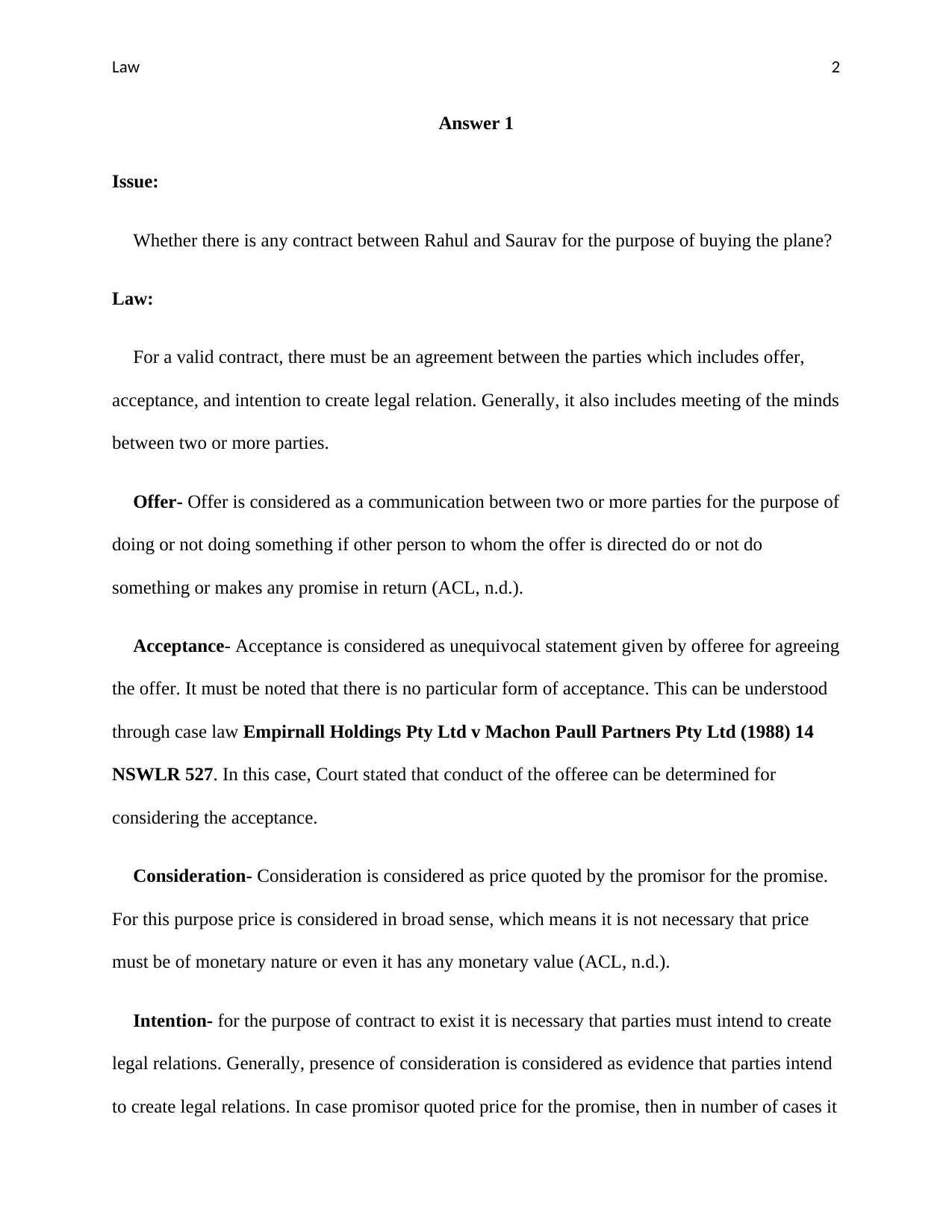
Law 2
Answer 1
Issue:
Whether there is any contract between Rahul and Saurav for the purpose of buying the plane?
Law:
For a valid contract, there must be an agreement between the parties which includes offer,
acceptance, and intention to create legal relation. Generally, it also includes meeting of the minds
between two or more parties.
Offer- Offer is considered as a communication between two or more parties for the purpose of
doing or not doing something if other person to whom the offer is directed do or not do
something or makes any promise in return (ACL, n.d.).
Acceptance- Acceptance is considered as unequivocal statement given by offeree for agreeing
the offer. It must be noted that there is no particular form of acceptance. This can be understood
through case law Empirnall Holdings Pty Ltd v Machon Paull Partners Pty Ltd (1988) 14
NSWLR 527. In this case, Court stated that conduct of the offeree can be determined for
considering the acceptance.
Consideration- Consideration is considered as price quoted by the promisor for the promise.
For this purpose price is considered in broad sense, which means it is not necessary that price
must be of monetary nature or even it has any monetary value (ACL, n.d.).
Intention- for the purpose of contract to exist it is necessary that parties must intend to create
legal relations. Generally, presence of consideration is considered as evidence that parties intend
to create legal relations. In case promisor quoted price for the promise, then in number of cases it
Answer 1
Issue:
Whether there is any contract between Rahul and Saurav for the purpose of buying the plane?
Law:
For a valid contract, there must be an agreement between the parties which includes offer,
acceptance, and intention to create legal relation. Generally, it also includes meeting of the minds
between two or more parties.
Offer- Offer is considered as a communication between two or more parties for the purpose of
doing or not doing something if other person to whom the offer is directed do or not do
something or makes any promise in return (ACL, n.d.).
Acceptance- Acceptance is considered as unequivocal statement given by offeree for agreeing
the offer. It must be noted that there is no particular form of acceptance. This can be understood
through case law Empirnall Holdings Pty Ltd v Machon Paull Partners Pty Ltd (1988) 14
NSWLR 527. In this case, Court stated that conduct of the offeree can be determined for
considering the acceptance.
Consideration- Consideration is considered as price quoted by the promisor for the promise.
For this purpose price is considered in broad sense, which means it is not necessary that price
must be of monetary nature or even it has any monetary value (ACL, n.d.).
Intention- for the purpose of contract to exist it is necessary that parties must intend to create
legal relations. Generally, presence of consideration is considered as evidence that parties intend
to create legal relations. In case promisor quoted price for the promise, then in number of cases it
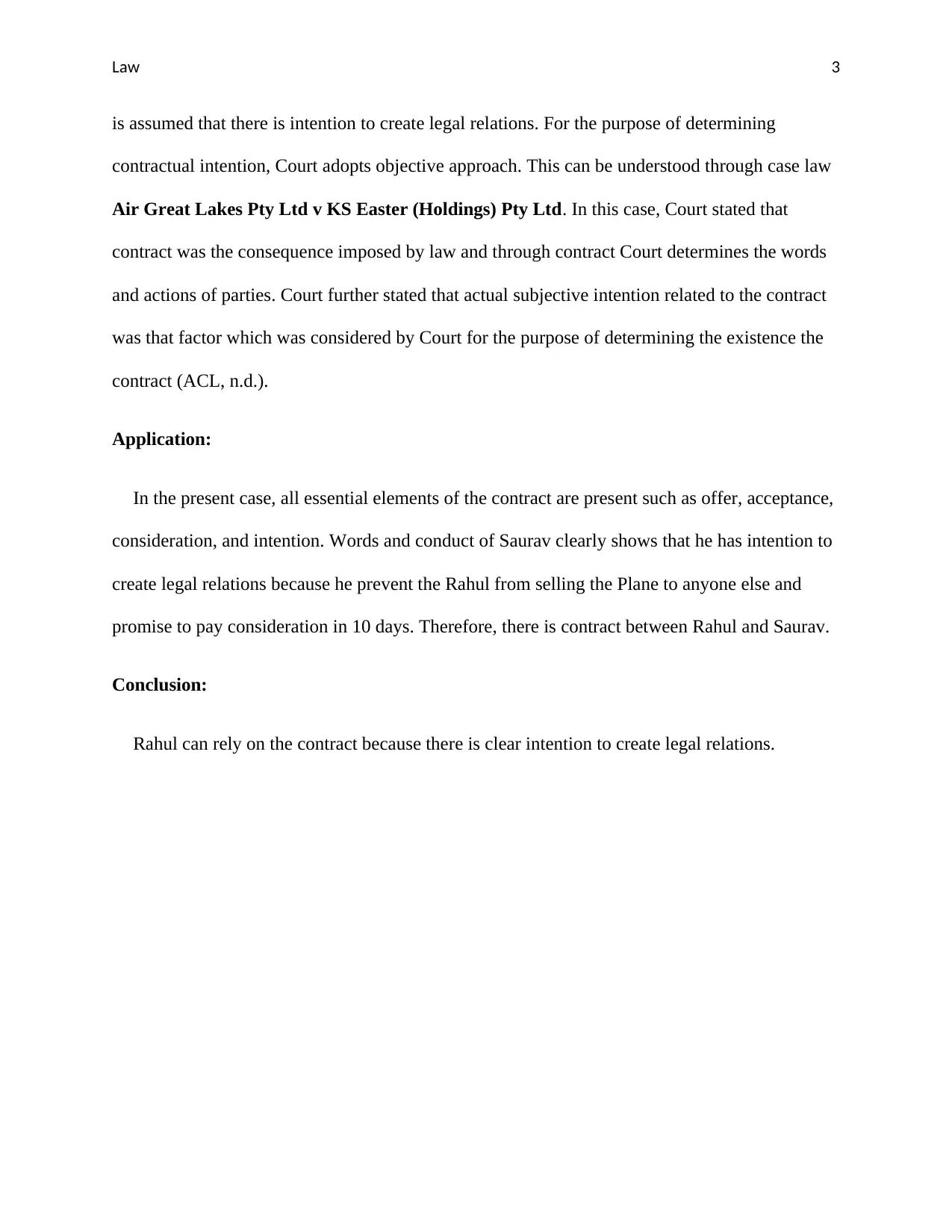
Law 3
is assumed that there is intention to create legal relations. For the purpose of determining
contractual intention, Court adopts objective approach. This can be understood through case law
Air Great Lakes Pty Ltd v KS Easter (Holdings) Pty Ltd. In this case, Court stated that
contract was the consequence imposed by law and through contract Court determines the words
and actions of parties. Court further stated that actual subjective intention related to the contract
was that factor which was considered by Court for the purpose of determining the existence the
contract (ACL, n.d.).
Application:
In the present case, all essential elements of the contract are present such as offer, acceptance,
consideration, and intention. Words and conduct of Saurav clearly shows that he has intention to
create legal relations because he prevent the Rahul from selling the Plane to anyone else and
promise to pay consideration in 10 days. Therefore, there is contract between Rahul and Saurav.
Conclusion:
Rahul can rely on the contract because there is clear intention to create legal relations.
is assumed that there is intention to create legal relations. For the purpose of determining
contractual intention, Court adopts objective approach. This can be understood through case law
Air Great Lakes Pty Ltd v KS Easter (Holdings) Pty Ltd. In this case, Court stated that
contract was the consequence imposed by law and through contract Court determines the words
and actions of parties. Court further stated that actual subjective intention related to the contract
was that factor which was considered by Court for the purpose of determining the existence the
contract (ACL, n.d.).
Application:
In the present case, all essential elements of the contract are present such as offer, acceptance,
consideration, and intention. Words and conduct of Saurav clearly shows that he has intention to
create legal relations because he prevent the Rahul from selling the Plane to anyone else and
promise to pay consideration in 10 days. Therefore, there is contract between Rahul and Saurav.
Conclusion:
Rahul can rely on the contract because there is clear intention to create legal relations.
⊘ This is a preview!⊘
Do you want full access?
Subscribe today to unlock all pages.

Trusted by 1+ million students worldwide
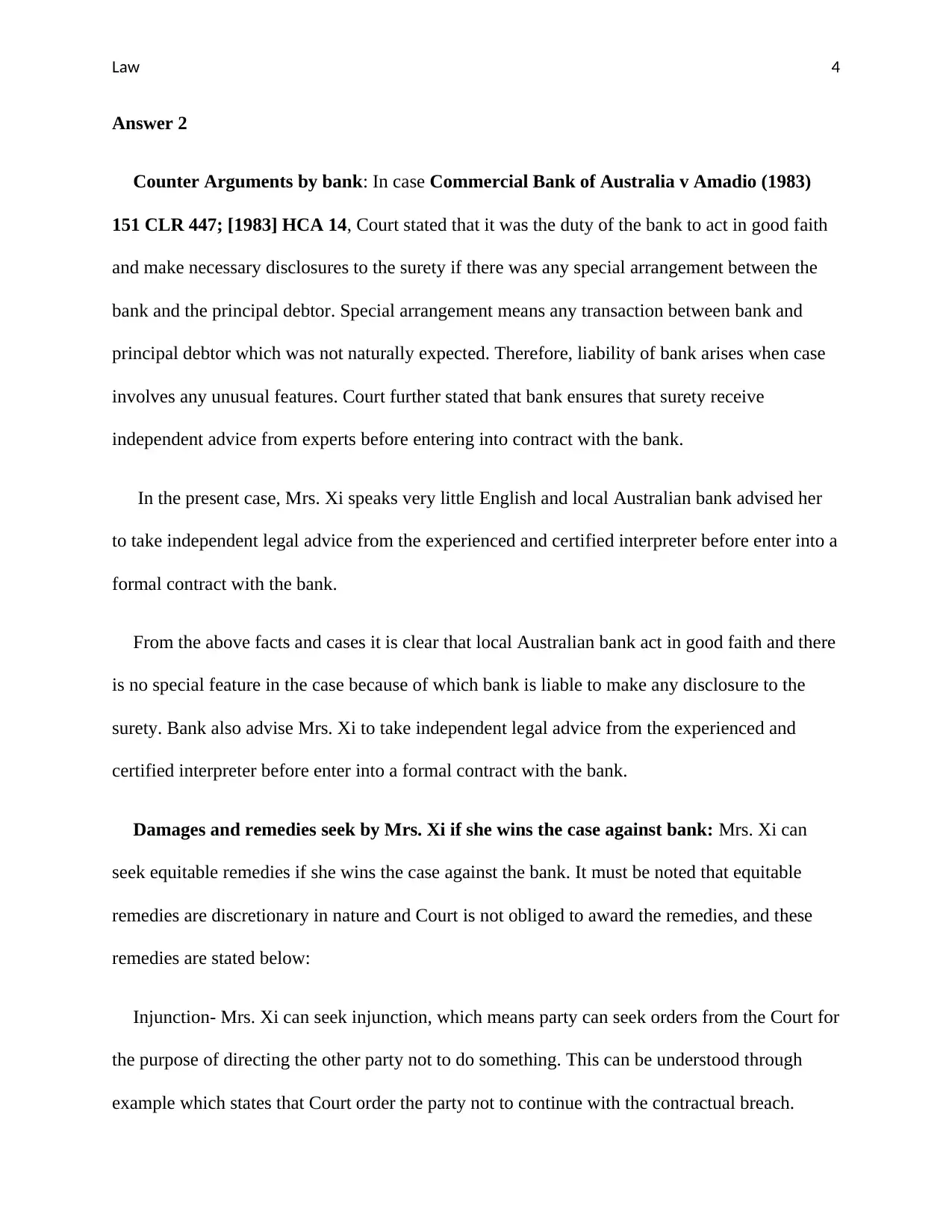
Law 4
Answer 2
Counter Arguments by bank: In case Commercial Bank of Australia v Amadio (1983)
151 CLR 447; [1983] HCA 14, Court stated that it was the duty of the bank to act in good faith
and make necessary disclosures to the surety if there was any special arrangement between the
bank and the principal debtor. Special arrangement means any transaction between bank and
principal debtor which was not naturally expected. Therefore, liability of bank arises when case
involves any unusual features. Court further stated that bank ensures that surety receive
independent advice from experts before entering into contract with the bank.
In the present case, Mrs. Xi speaks very little English and local Australian bank advised her
to take independent legal advice from the experienced and certified interpreter before enter into a
formal contract with the bank.
From the above facts and cases it is clear that local Australian bank act in good faith and there
is no special feature in the case because of which bank is liable to make any disclosure to the
surety. Bank also advise Mrs. Xi to take independent legal advice from the experienced and
certified interpreter before enter into a formal contract with the bank.
Damages and remedies seek by Mrs. Xi if she wins the case against bank: Mrs. Xi can
seek equitable remedies if she wins the case against the bank. It must be noted that equitable
remedies are discretionary in nature and Court is not obliged to award the remedies, and these
remedies are stated below:
Injunction- Mrs. Xi can seek injunction, which means party can seek orders from the Court for
the purpose of directing the other party not to do something. This can be understood through
example which states that Court order the party not to continue with the contractual breach.
Answer 2
Counter Arguments by bank: In case Commercial Bank of Australia v Amadio (1983)
151 CLR 447; [1983] HCA 14, Court stated that it was the duty of the bank to act in good faith
and make necessary disclosures to the surety if there was any special arrangement between the
bank and the principal debtor. Special arrangement means any transaction between bank and
principal debtor which was not naturally expected. Therefore, liability of bank arises when case
involves any unusual features. Court further stated that bank ensures that surety receive
independent advice from experts before entering into contract with the bank.
In the present case, Mrs. Xi speaks very little English and local Australian bank advised her
to take independent legal advice from the experienced and certified interpreter before enter into a
formal contract with the bank.
From the above facts and cases it is clear that local Australian bank act in good faith and there
is no special feature in the case because of which bank is liable to make any disclosure to the
surety. Bank also advise Mrs. Xi to take independent legal advice from the experienced and
certified interpreter before enter into a formal contract with the bank.
Damages and remedies seek by Mrs. Xi if she wins the case against bank: Mrs. Xi can
seek equitable remedies if she wins the case against the bank. It must be noted that equitable
remedies are discretionary in nature and Court is not obliged to award the remedies, and these
remedies are stated below:
Injunction- Mrs. Xi can seek injunction, which means party can seek orders from the Court for
the purpose of directing the other party not to do something. This can be understood through
example which states that Court order the party not to continue with the contractual breach.
Paraphrase This Document
Need a fresh take? Get an instant paraphrase of this document with our AI Paraphraser
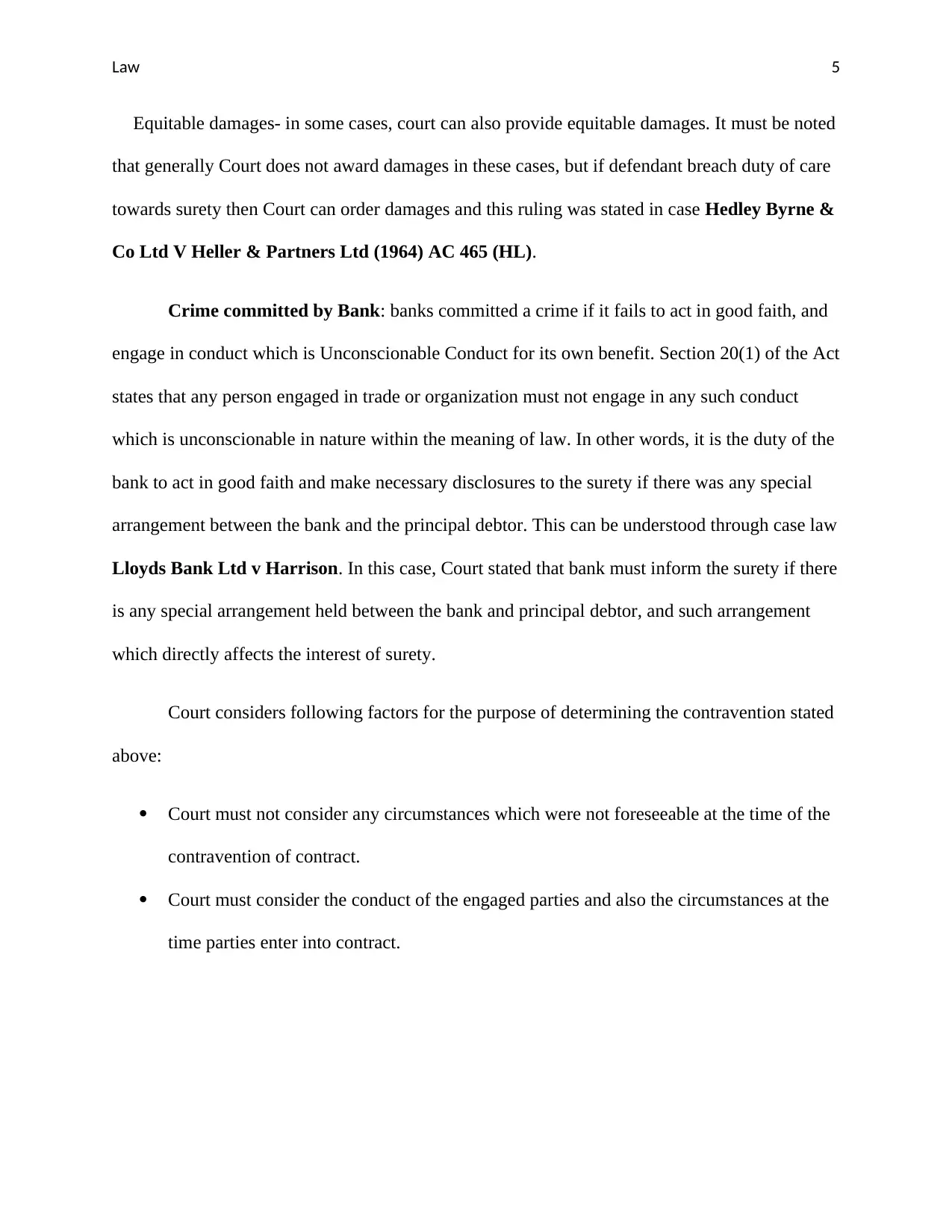
Law 5
Equitable damages- in some cases, court can also provide equitable damages. It must be noted
that generally Court does not award damages in these cases, but if defendant breach duty of care
towards surety then Court can order damages and this ruling was stated in case Hedley Byrne &
Co Ltd V Heller & Partners Ltd (1964) AC 465 (HL).
Crime committed by Bank: banks committed a crime if it fails to act in good faith, and
engage in conduct which is Unconscionable Conduct for its own benefit. Section 20(1) of the Act
states that any person engaged in trade or organization must not engage in any such conduct
which is unconscionable in nature within the meaning of law. In other words, it is the duty of the
bank to act in good faith and make necessary disclosures to the surety if there was any special
arrangement between the bank and the principal debtor. This can be understood through case law
Lloyds Bank Ltd v Harrison. In this case, Court stated that bank must inform the surety if there
is any special arrangement held between the bank and principal debtor, and such arrangement
which directly affects the interest of surety.
Court considers following factors for the purpose of determining the contravention stated
above:
Court must not consider any circumstances which were not foreseeable at the time of the
contravention of contract.
Court must consider the conduct of the engaged parties and also the circumstances at the
time parties enter into contract.
Equitable damages- in some cases, court can also provide equitable damages. It must be noted
that generally Court does not award damages in these cases, but if defendant breach duty of care
towards surety then Court can order damages and this ruling was stated in case Hedley Byrne &
Co Ltd V Heller & Partners Ltd (1964) AC 465 (HL).
Crime committed by Bank: banks committed a crime if it fails to act in good faith, and
engage in conduct which is Unconscionable Conduct for its own benefit. Section 20(1) of the Act
states that any person engaged in trade or organization must not engage in any such conduct
which is unconscionable in nature within the meaning of law. In other words, it is the duty of the
bank to act in good faith and make necessary disclosures to the surety if there was any special
arrangement between the bank and the principal debtor. This can be understood through case law
Lloyds Bank Ltd v Harrison. In this case, Court stated that bank must inform the surety if there
is any special arrangement held between the bank and principal debtor, and such arrangement
which directly affects the interest of surety.
Court considers following factors for the purpose of determining the contravention stated
above:
Court must not consider any circumstances which were not foreseeable at the time of the
contravention of contract.
Court must consider the conduct of the engaged parties and also the circumstances at the
time parties enter into contract.
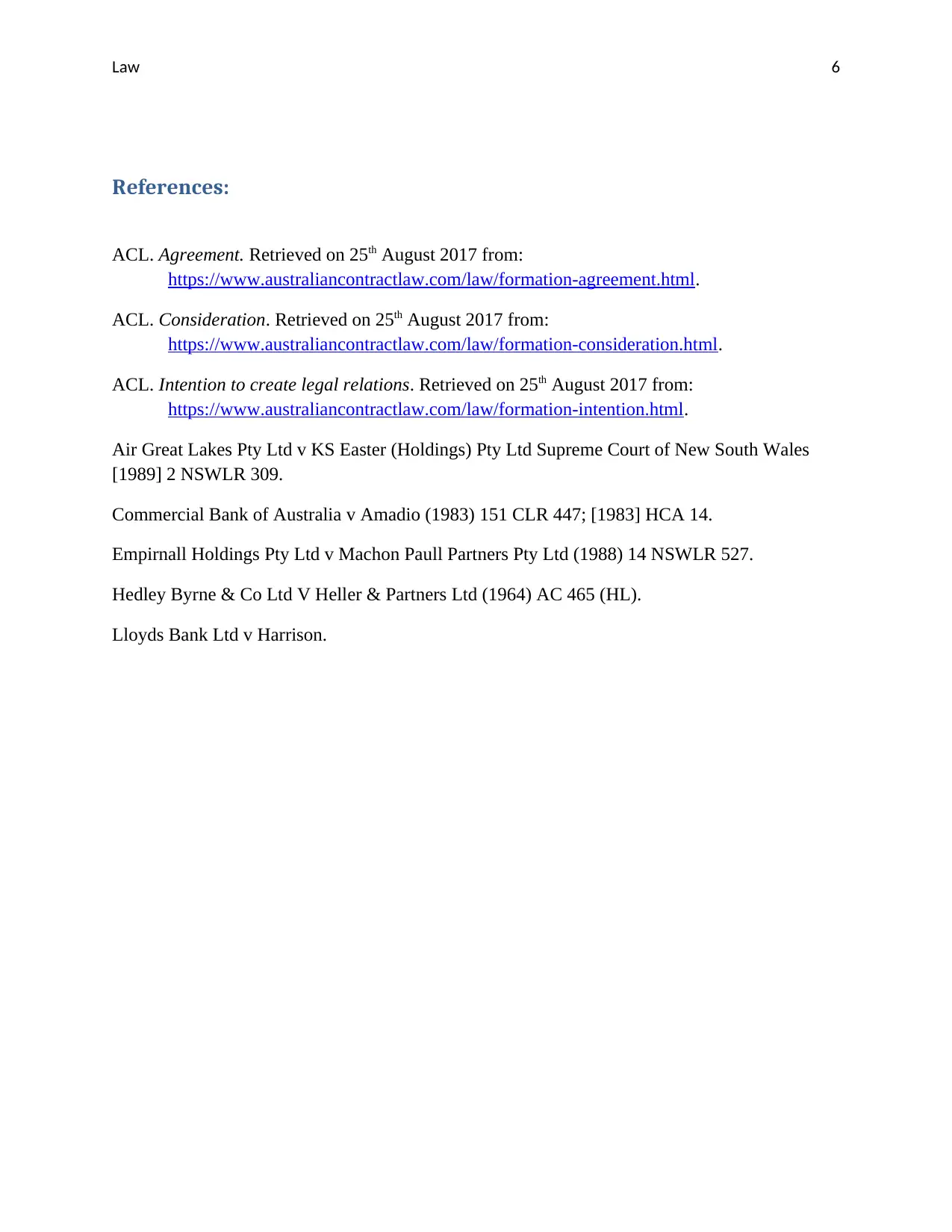
Law 6
References:
ACL. Agreement. Retrieved on 25th August 2017 from:
https://www.australiancontractlaw.com/law/formation-agreement.html.
ACL. Consideration. Retrieved on 25th August 2017 from:
https://www.australiancontractlaw.com/law/formation-consideration.html.
ACL. Intention to create legal relations. Retrieved on 25th August 2017 from:
https://www.australiancontractlaw.com/law/formation-intention.html.
Air Great Lakes Pty Ltd v KS Easter (Holdings) Pty Ltd Supreme Court of New South Wales
[1989] 2 NSWLR 309.
Commercial Bank of Australia v Amadio (1983) 151 CLR 447; [1983] HCA 14.
Empirnall Holdings Pty Ltd v Machon Paull Partners Pty Ltd (1988) 14 NSWLR 527.
Hedley Byrne & Co Ltd V Heller & Partners Ltd (1964) AC 465 (HL).
Lloyds Bank Ltd v Harrison.
References:
ACL. Agreement. Retrieved on 25th August 2017 from:
https://www.australiancontractlaw.com/law/formation-agreement.html.
ACL. Consideration. Retrieved on 25th August 2017 from:
https://www.australiancontractlaw.com/law/formation-consideration.html.
ACL. Intention to create legal relations. Retrieved on 25th August 2017 from:
https://www.australiancontractlaw.com/law/formation-intention.html.
Air Great Lakes Pty Ltd v KS Easter (Holdings) Pty Ltd Supreme Court of New South Wales
[1989] 2 NSWLR 309.
Commercial Bank of Australia v Amadio (1983) 151 CLR 447; [1983] HCA 14.
Empirnall Holdings Pty Ltd v Machon Paull Partners Pty Ltd (1988) 14 NSWLR 527.
Hedley Byrne & Co Ltd V Heller & Partners Ltd (1964) AC 465 (HL).
Lloyds Bank Ltd v Harrison.
⊘ This is a preview!⊘
Do you want full access?
Subscribe today to unlock all pages.

Trusted by 1+ million students worldwide
1 out of 6
Related Documents
Your All-in-One AI-Powered Toolkit for Academic Success.
+13062052269
info@desklib.com
Available 24*7 on WhatsApp / Email
![[object Object]](/_next/static/media/star-bottom.7253800d.svg)
Unlock your academic potential
Copyright © 2020–2026 A2Z Services. All Rights Reserved. Developed and managed by ZUCOL.





